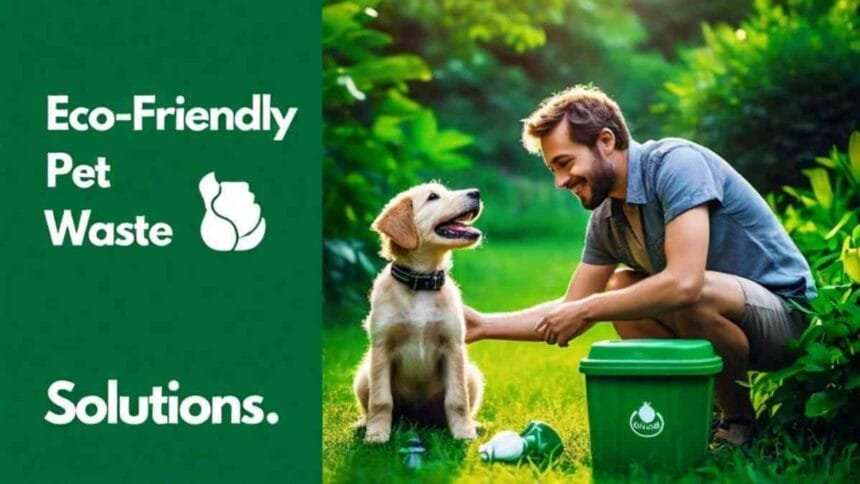As pet ownership continues to rise, so does the responsibility of keeping our furry friends healthy and happy while caring for the environment. Pet waste disposal is an often overlooked yet critical issue. Many pet owners use plastic bags or dispose of waste improperly, contributing to the growing environmental problem. This guide highlights eco-friendly pet waste disposal methods and provides sustainable solutions for responsible pet owners who want to reduce their carbon pawprint.
Understanding the Environmental Impact of Pet Waste:
Pet waste, when not disposed of properly, has a negative impact on the environment. Traditional plastic bags used for scooping pet poop take hundreds of years to decompose, clogging landfills and harming wildlife. Furthermore, pet waste contains harmful bacteria and parasites, which can contaminate water sources if left untreated or improperly disposed of.
On average, a single dog produces approximately 0.75 pounds of waste per day. With over 89 million pet dogs in the U.S. alone, that adds up to a staggering amount of waste that, if not properly managed, can have long-term environmental effects.
Eco-Friendly Pet Waste Disposal Methods:
- Biodegradable Poop Bags:
One of the simplest and most effective ways to reduce the environmental impact of pet waste is by using biodegradable poop bags. Unlike traditional plastic bags, which take centuries to decompose, biodegradable bags break down in the environment within a few months. These bags are made from plant-based materials such as cornstarch and are designed to reduce the accumulation of harmful plastic in landfills.
Tip: Look for certified biodegradable poop bags that meet ASTM (American Society for Testing and Materials) standards to ensure they break down naturally without leaving harmful residues.
- Pet Waste Composting:
Composting is another sustainable option for pet waste disposal. Pet waste composting is a process where pet waste is mixed with other organic materials like food scraps, leaves, and grass clippings, and decomposed in a controlled environment. This method transforms waste into nutrient-rich compost that can be used to enrich garden soil. However, it’s important to use a special composting system designed for pet waste to ensure it reaches the right temperatures to kill harmful bacteria and parasites.
Tip: Invest in a pet waste composting bin specifically designed for the task. Avoid using compost made from dog or cat waste on edible plants due to potential contamination from parasites.
- Flushable Dog Waste Bags:
Flushable dog waste bags are another eco-friendly alternative to plastic bags. These bags can be flushed down the toilet, ensuring the waste is treated in a sewage treatment plant instead of ending up in a landfill. They are typically made from biodegradable, non-toxic materials and decompose quickly in water.
Tip: Always check your local plumbing system before flushing pet waste to ensure it won’t cause blockages.
- Pet Waste Disposal Systems:
For those looking for a more automated solution, pet waste disposal systems like the Doggie Dooley or Scooper Pail are perfect for the job. These systems use enzymes and bacteria to break down dog waste in a yard or garden. Doggie Dooley systems are placed underground and function similarly to a septic tank, allowing waste to decompose and naturally filter into the ground without harming the environment.
Tip: These systems work best for smaller to medium-sized dogs. For large dogs or multiple pets, you may need a larger system to ensure it can handle the waste load.
- Pet Waste Disposal Services:
Some areas offer pet waste removal services that can help owners dispose of their pet waste in an environmentally responsible manner. These services often collect waste and take it to facilities that properly dispose of it, ensuring it doesn’t end up in a landfill. This method is particularly useful for busy pet owners who don’t have the time or ability to handle pet waste disposal themselves.
Tip: Research local waste removal services to see if they offer eco-friendly disposal options and check their pricing to determine if it fits your budget.
- Use of Natural Enzymes and Bio-Degradable Cleaners:
For pet waste that accumulates on outdoor surfaces such as patios, sidewalks, or in the garden, natural enzymatic cleaners can help break down the waste more effectively. These cleaners use natural enzymes and microorganisms to neutralize odors and safely degrade pet waste. Avoid using harsh chemicals, as they can harm the environment and local wildlife.
Tip: Choose biodegradable, non-toxic cleaners that are safe for pets, plants, and water sources.
Additional Tips for Eco-Friendly Pet Ownership:
- Use Natural, Non-Toxic Pet Products: From grooming products to toys, opt for natural, sustainable, and non-toxic alternatives that minimize your pet’s environmental footprint.
- Adopt a Green Lifestyle for Your Pet: Practice sustainable habits, such as reducing plastic use, recycling pet packaging, and opting for energy-efficient pet care products like heated beds or LED collars.
- Support Eco-Friendly Brands: When purchasing pet products, choose brands that prioritize sustainability, ethical sourcing, and environmental responsibility in their manufacturing processes.
Conclusion:
Pet waste disposal doesn’t have to be an environmental burden. By adopting eco-friendly practices and choosing sustainable solutions, pet owners can significantly reduce their impact on the environment while still providing the best care for their pets. Whether it’s using biodegradable poop bags, composting pet waste, or investing in pet waste disposal systems, there are plenty of responsible options available. Every small change counts, and together, we can create a cleaner, greener world for both our pets and future generations.

